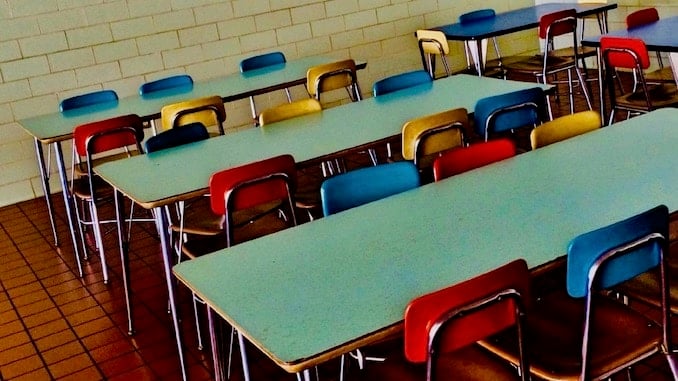Andy Boardman: Middle class families struggle with lunch costs, too
If you didn’t hear about Warwick’s short-lived school lunch policy in local news, perhaps you read about it in the New York Times, NBC, NPR or another national outlet. On May 5, Warwick Public Schools announced it would begin implementing a policy targeting students with outstanding lunch account balances. The district would bar these students from hot lunch options, and
May 13, 2019, 4:23 pm
By Andy Boardman
If you didn’t hear about Warwick’s short-lived school lunch policy in local news, perhaps you read about it in the New York Times, NBC, NPR or another national outlet.
On May 5, Warwick Public Schools announced it would begin implementing a policy targeting students with outstanding lunch account balances. The district would bar these students from hot lunch options, and limit them to a sunbutter and jelly sandwich plus milk and a fruit or vegetable side. The district was swiftly and roundly criticized for punishing students for their parents’ financial standing. Criticism heightened when the district initially turned away offers to pay down the debt. (It has since reversed course.)
Interestingly, a backlash to the backlash soon emerged. A contingency has come to argue that Warwick was fully justified in its actions, because its policy would mostly punish children from middle class families rather than poor ones. I believe this contingency is mistaken.
“Even more important is the fact that a vast majority of families who owe lunch money debt can seemingly afford it, but they simply haven’t paid,” reads an editorial from the Warwick Beacon defending the district’s policy. “According to Superintendent Philip Thornton, 72 percent of the outstanding lunch debt, nearly three in four kids who owe money, are kids that are not a part of the free and reduced lunch program.” Rhode Island education blogger Erika Sanzi similarly writes that “[p]lenty of the lunch debt is held by parents who can and should pay.”
It’s true that many of the families in question are likely middle class; no harm is done in pointing this out. These pieces, however, take things one step further by implying that middle class families have no right to fall behind on the costs of caring for their children. Because middle class parents can afford to cover the costs of school lunches, they are undeserving of our sympathy and support when they fall behind.
This reading of the situation misses an important point: having and raising a child is a huge financial commitment whether or not you’re poor. Even middle class families struggle to keep up with the everyday expenses of child rearing. Middle class parents are not “deadbeats” for struggling to cover these costs. Rather, our economy is flawed for not adequately supporting all families.
We should all remember that there are two distinct economic issues to address when thinking about child and family supports. The first is a problem recognized, in a general sense, by Sanzi and the Beacon editorial board: having children throws many families into poverty, and this is unjust. Matt Bruenig of the People’s Policy Project estimates that half of impoverished adults are brought below the poverty line by the costs of raising their children. All children deserve — at the very least — the necessary components of a flourishing life, including nutritious food, quality education and socioeconomic inclusion, regardless of their parents’ economic standing.
The second issue is one that Sanzi and the Beacon editorial board would likely recognize in most contexts, but disregard in the context of school lunches for some reason. We know that children — once they grow up to become workers, artists and so forth — are a huge public benefit. What’s more, the ability to choose if and when to have children is a core part of a liberal conception of freedom.
It doesn’t make sense to expect even moderate-income parents who could fully cover the costs of raising their children to do so. The current costs of raising a child still heavily burden these families. Parents at nearly all income levels are deserving of public support, because the ability to have and raise children and children themselves are valuable to us all. This is not a radical concept; rather, it’s part of the reason why we have free universal public education to begin with.
Low-income families – without question – need positive relief in covering the costs of raising children. To this extent, it’s embarrassing that 65 (65!) schools in low-income Rhode Island communities could offer federally-funded free lunches to all students but have opted not to. This needs to be fixed. More generally, we can support low-income families by improving and expanding paid family leave, cash assistance and the minimum wage.
But it’s misguided to believe that supporting low-income families precludes us from helping middle class families, too. This is why expanding free and reduced-price lunch to all students throughout the state makes sense. Rhode Island can also address the financial burden of child rearing more broadly by enacting a state-level child allowance or child tax credit.
The Warwick debacle has made one thing clear: local school districts can not be expected to implement economic justice on their own. Local, state and federal governments and associations — from PTAs to the president — should do more to ensure that all families have the resources they need to thrive. Those who argue otherwise are selling families short.






